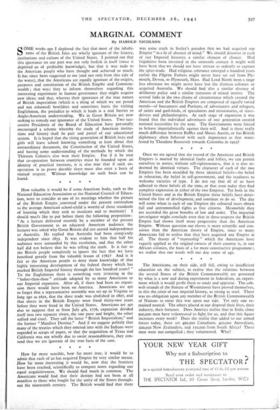How far more sensible, how far more true, it would
be to admit that each of us has acquired Empire by very similar means. How far more interesting it would be, now that the frontiers have been reached, scientifically to compare notes regarding our equal acquisitiveness. We should find much in common. The Americans would find that their destiny had not been at all manifest to those who fought for the unity of the States through- out the nineteenth century. The British would find that there was some truth in Seeley's paradox that we had acquired our Empire " in a fit of absence of mind." We should discover in each of our Imperial histories a similar element of chance. Had frigidaires been invented in the sixteenth century it might well have been that we should not have striven so ardently to capture the spice-trade. Had religious tolerance emerged a hundred years earlier the Pilgrim Fathers might never have set sail from Ply- mouth, Devon, to Plymouth, Mass. Had Lord North been a tinge less obstinate we might never have lost the thirteen colonies or acquired Australia. We should find also a similar absence of deliberate policy and a similar intrusion of mixed motive. The several links in the two chains of circumstance which created the American and the British Empires are composed of equally varied metals—of buccaneers and Puritans, of adventurers and refugees, of saints and gaol-birds, of speculators and missionaries, of slave- drivers and philanthropists. At each stage of expansion it was found that the individual adventures of one generation created national necessities for the next. The Governments were forced to behave imperialistically against their will. And is there really much difference between Raffles and Moses Austin, or has British diplomacy often behaved with such impatience as that mani- fested by Theodore Roosevelt towards Colombia in 1903?






















 Previous page
Previous page